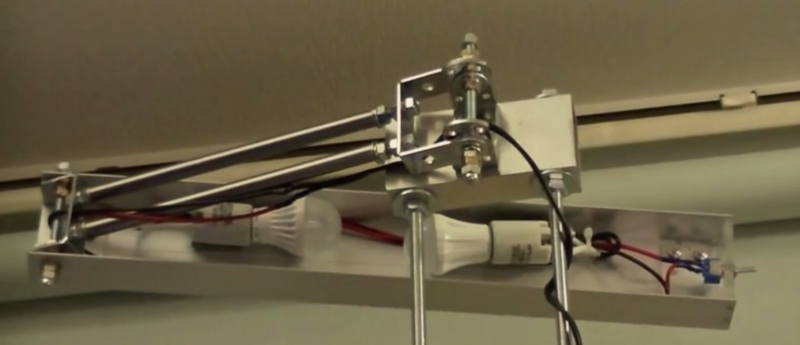[Samimy] raided his parts bin to build this articulated lamp (YouTube link) for his computer workstation. Two pieces of aluminum angle form the main body of the lamp. Several brackets are used to form two hinges which allow the lamp to be positioned above [Samimy’s] monitor. The light in this case comes from a pair of 4 watt LED bulbs.
[Samimy] used double nuts on the moving parts to make sure nothing comes loose. The outer nuts are acorns, which ensure no one will get cut on an exposed bit of threaded rod. [Samimy] wired the two bulbs up in a proper parallel mains circuit. The switch is a simple toggle mounted in a piece of Plexiglass on the end of the lamp.
One thing we would like to see on this build is a ground wire. With all that exposed aluminum and steel, one loose connection or worn bit of insulation could make the entire lamp body live.
















Not a lot of details about the wiring but I agree with the ground wire. It is also important with a screw-in base to wire the threaded contact to neutral and the hot side through the switch.
The cord could also use some plastic or rubber grommets and other protection! I see 2 pinch points and 1 bare metal hole the cord passes through.
while we are on the subject of safety improvements. Make sure the switch is not rated only for 125AC if you live in 230V AC area
It would be nice if you could get consumer-electronics cords with GCFI plugs on them so you don’t have to scavenge cheap hair dryers.
That thing is so f**king dangerous it should be in the HAD FAIL category. It’s an object lesson in what not to do, to the point where plugging it in is borderline illegal in the more civilised parts of the world.
what actually made you very emotional and angry about the video?
it hasn’t killed anyone yet so calm down !
i have wired and covered everything safely, it is connected to the Surge Protector Power Strip. the amount of current and voltage is safely distributed to both. and i am happy using it now in then. fail? why? explain more, i will be glad to answer your questions. i am not a melon or matchstick hacker on youtube, i have studied electronics.
just if it is not that fancy to make you say wow, it does not mean it is useless or dangerous.
“i am the maker of that lamp”
I like how you say “yet”, but I agree with you on this one. It looks dangerous, but there are safety precautions taken into building it. I say it’s a good hack.
‘studied electronics’ (whatever that means) doesn’t make you an electrician or that well versed in mains safety.
Obvious fail is that switch – a bit of heatshrink over the wiring isn’t insulation. Having the back of the switch exposed is an immediate fail (unearthed and not double insulated).
You haven’t even bothered with strain relief – never mind safety, that’s just a reliability issue
Soldered wires with a bit of heatshrink over them flapping in the breeze? That’s just sloppy. Here’s a tip – cut them to different lengths before soldering so they don’t sit next to each other, then slip more heatshrink over them.
Even better tip – use a terminal block.
When even the HAD editors think it’s a bit dodgy, then yeah, it’s dodgy.
(HAD haven’t had a ‘let’s post a crap project so everyone can feel clever by pointing out it’s numerous faults’ article for a while. Congrats – you’re it!)
“‘studied electronics’ (whatever that means) doesn’t make you an electrician or that well versed in mains safety.”
That. An imperial gazillion times that.
If you think it is so dangerous, why not offer suggestions on how Samimy can make the lamp safer? I’ve already suggested adding a ground.
Up next on Hackaday: we show you how to construct an etherkiller!
Live wires wrapped around screw-rod that rubs it each time you turn it. solid metal frame, fully conductive throughout and no grounding wire for safety, perfect!
But snarkyness aside I feel like the design could have implemented the folding portions better, particularly since it’s a custom design it doesn’t feel like it really fills in the niche it was designed for and a clip-on lamp on the edge of the shelf would have worked just as well if not better maybe?
Well, it’s a mostly metal frame.
He did mount the switch in a bit of plastic, probably because he couldn’t find a bit of metal that size.
Mind you that switch is only single pole, inadequately insulated, (probably) mounted too close to the frame and probably not current rated, but anyway.
His reliance on having a ‘surge protector power strip’ to protect him is similar to why I’ve been putting off getting my car brakes fixed – I mean the airbag will work, right?
(I wonder if he knows what a ‘surge protector’ does…)
the switch is Made in Japan, rated 120V, 6A, more than enough for those little LEDs.
i actually connect all my electronic devices including LEDs to Surge Protectors. i know what it does.
it protects the electronics from over current during lightning (thunder).
and by saying that, i simply meant that i want to protect the LED from lightning, not myself from LED lamp :)
Ah, I see you don’t know what a surge protector does.
ok then, maybe someone wrote a wrong article on wikipedia, so that is not my fault :)
Lol, looks like more “study” is required!